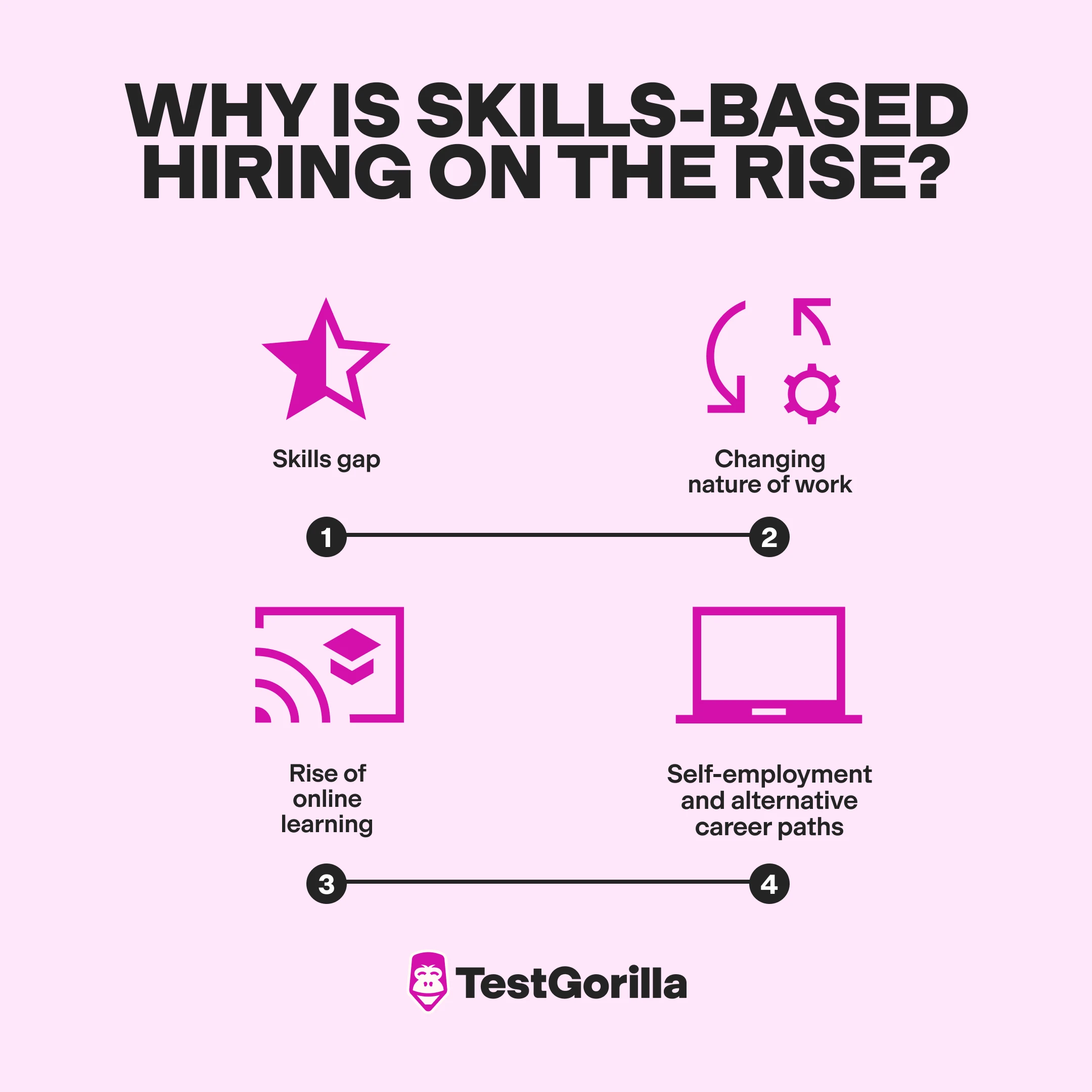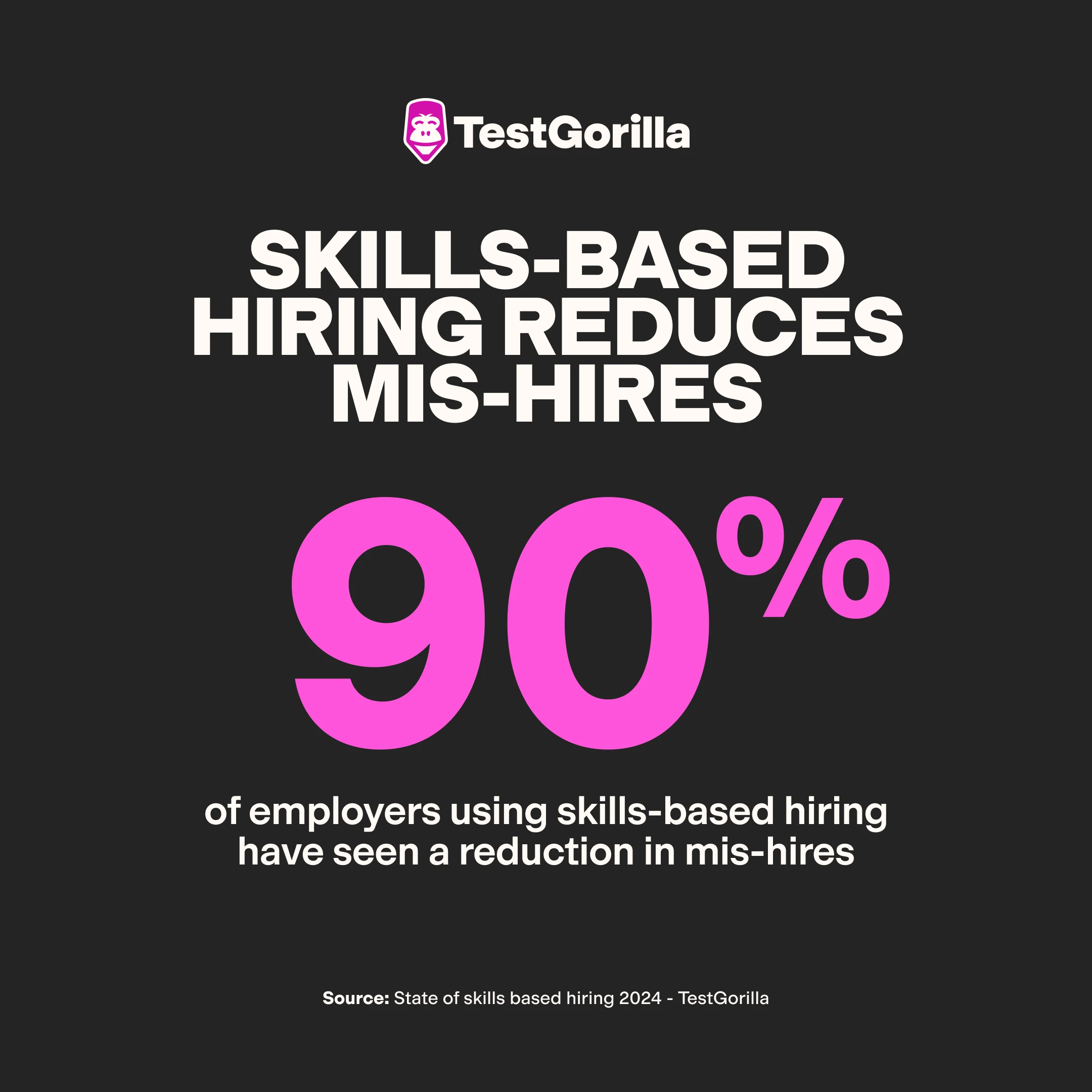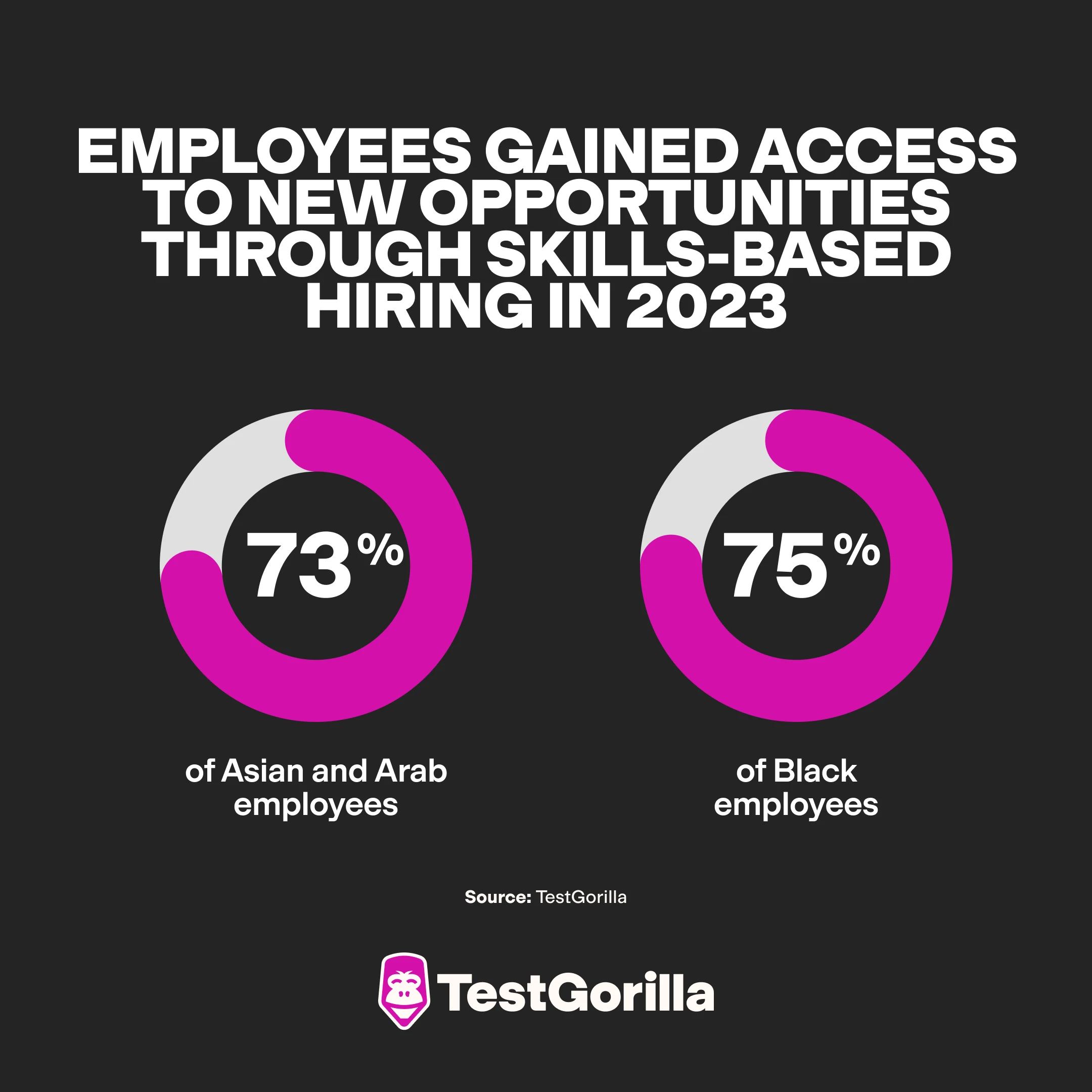52 key skills-based hiring statistics
If you’re interested in anything skills-based hiring-related – whether it’s rate of adoption, employee attitudes, or the benefits and impact of this hiring practice – then you’re in exactly the right place.
We collected responses from over 2,000 employers and employees to bring you The State of Skills-Based Hiring 2025. Now, we’re compiling data collected in 2024 and 2025 to bring you 52 key skills-based hiring statistics.
Employers and skills-based hiring statistics
In 2025, the majority of employers have adopted some form of skills-based hiring. They perceive it as an effective hiring strategy, and they’re seeing measurable benefits. Here are some statistics on employer adoption, attitudes to, and benefits of skills-based hiring
Employer adoption of skills-based hiring
Globally, 85% of companies are using skills-based hiring in 2025.
This is compared to 81% in 2024 and 73% in 2023.
59% of those employers started using skills-based hiring in the last two years.
30% are using cognitive ability tests
31% are using role-specific tests
16% are using work sample assignments
23% are using self-report tests
38% of companies expect their budget for skills-based hiring to increase in the next 12 months, and 58% say it will stay the same.
Employer attitudes to skills-based hiring
65% of employers believe skills-based hiring is more effective at identifying talented candidates than resumes
71% of employers believe that skills-based hiring is more predictive of on-the-job success than resumes
65% of employers believe that employees hired via skills-based hiring stay longer in their roles
56% said skills-based hiring helps them verify candidates' soft skills
54% said it helps them verify hard skills
53% said it helps them verify cognitive abilities
Benefits of skills-based hiring for employers
90% of employers using skills-based hiring reduced mis-hires
91% of employers using skills-based hiring boosted retention
81% of employers using skills-based hiring reduced their total time-to-hire
78% of employers using skills-based hiring reduced their total hiring costs
90% of employers using skills-based hiring improved workplace diversity
Skills-based hiring adoption rates statistics
Let’s dive a little deeper into the data on skills-based hiring adoption rates. Below are 10 statistics about skills-based hiring adoption rates divided by organization type, industry, and region.
By organization type
75% of remote organizations use skills-based hiring
85% of hybrid organizations use skills-based hiring
70% of in-person organizations use skills-based hiring
Companies with between 501 and 1000 employees are using skills-based hiring the most in 2024 (88%)
By industry
The industries with the highest adoption rates of skills-based hiring in 2024 were marketing (95%), scientific and technical services (89%), and construction (89%)
The industries with the lowest adoption rates were hotel and foods services (54%), wholesale (56%), and government and public institutions (61%)
By region
85% of US companies are using skills-based hiring in 2025, compared to 71% in 2023
80% of Canadian companies are using skills-based hiring in 2024, compared to 74% in 2023
83% of UK companies are using skills-based hiring in 2025, compared to 75% in 2023
94% of Latin American companies are using skills-based hiring in 2024, compared to 72% in 2023
91% of Australian companies are using skills-based hiring in 2024, compared to 90% in 2023
67% of French companies are using skills-based hiring in 2024
86% of Spanish companies are using skills-based hiring in 2024
The best insights on HR and recruitment, delivered to your inbox.
Biweekly updates. No spam. Unsubscribe any time.
Employees and skills-based hiring statistics
Employees are incredibly supportive of the adoption of skills-based hiring practices; they perceive significant benefits and want to see adoption increase. Read key stats below!
Need more guidance on implementing skills-based hiring?
Read our complete handbook for all the tips, tools, and strategies you need to get the most out of this transformational approach to recruitment.
Employee attitudes to skills-based hiring
90% of candidates agree that they’re more likely to secure their dream job with skills-based hiring
81% of employees gained access to new employment opportunities through skills-based hiring in 2024. This is compared to 66% in 2023.
68% of employees said they prefer hiring processes that include skills-based assessments in 2024. This is compared to 56% in 2023.
15% prefer a hiring process without skills-based assessments.
56% of employees want to see the adoption of skills-based hiring increase
84% of employees feel that skills-based assessments help to reduce unconscious and/or conscious bias during the hiring process. This is up from 69% last year.
85% of employees agree that skills-based assessments help them better understand the specific job requirements of a role.
Of the 15% who prefer a hiring process that doesn't include skills-based assessments, 57% say it's because it makes them anxious, and 52% say it's because they end up taking tests that aren't relevant.
Skills-based hiring and diversity statistics
Diversity is an objective for the majority of employers and employees. Here are 5 statistics for skills-based hiring and diversity.
79% of employers report that diversity is an objective for them in 2025
81% say building an inclusive culture is important to them in 2025
61% of employers using skills-based hiring reported an improvement in diversity in 2025
42% of employees say they have experienced conscious and unconscious bias during the hiring process in 2025 (an increase from 31% in 2024 and 21% in 2023)
75% of Black employees gained access to employment opportunities through skills-based hiring in 2023
73% of Asian and Arab employees gained access to employment opportunities through skills-based hiring in 2023
The future of skills-based hiring statistics
In 2025, 38% of employers expect their budget for skills-based hiring to increase over the next 12 months. 58% say it will stay the same.
Only 4% of employers expect their skills-based hiring budget will decrease
29% of employers say they will use skills testing more than they did in the last 12 months, 60% say they'll use them the same amount
Only 12% of employers say they will use skills-based hiring less often
In 2025, 49% of employees want to see skills-based hiring usage increase in the next 12 months. This is up from 42% in 2023. 44% want it to stay the same.
Only 7% of employees want to see skills-based hiring adoption decrease
For the rest of the story, read our report
So there you have it – all the skills-based hiring statistics you could possibly need. In case you do need more, check out our State of Skills-Based Hiring report for the rest of the skills-based hiring story. Alternatively, check out 50 essential resume statistics.
You've scrolled this far
Why not try TestGorilla for free, and see what happens when you put skills first.






















